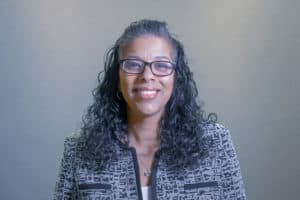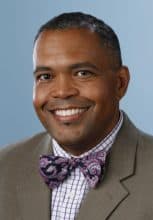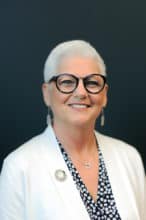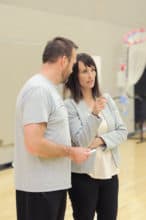Life U Celebrates Women’s History Month
In June 2019, Dr. Scott announced a University-wide diversity and inclusion initiative led by Dr. Karoline Oliveira, Special Assistant to the President for Diversity and Inclusion.
“I really think that Life University is in a position, and is really poised, to fully live out its Lasting Purpose: To Give, To Do, To Love, To Serve – Out of a Sense of Abundance,” Dr. Oliveira said.
“I think we are in a position, particularly with our diversity initiative, to understand our community better so we can serve our community better,” she continued. “What I mean by that is, understanding the multifaceted players and identities that we serve—people that come from all sorts of talents and skills and backgrounds, and how they contribute to the institution.”
The initiative was launched with three primary goals:
- Identify and recognize policies, activities and behaviors that support a diverse and inclusive community;
- Identify opportunities to further develop a diverse and inclusive community; and
- Design an institutional strategic plan for diversity and inclusion that will serve as a road map for all departments/divisions to work toward a diverse and inclusive community.
“We need to understand fully what is happening, and then certainly create experiences where we can do better while identifying ways we need to develop more,” she said. “Our Lasting Purpose is our guiding task; the work that I do is hopefully in line with that.”
Dr. Oliveira brought more than two decades of experience in what she termed “educational social justice” to her new role. She pointed out that LIFE has established many programs, services and efforts that support diversity and inclusion.
“I ask, ‘How do we create environments in higher ed where all students, all members of the community, faculty, staff, all constituents and all stakeholders feel included and valued, and feel that they can thrive in our educational environment?’”
There are four stages to the process. Over the summer, Dr. Oliveira went on what she called a “listening tour,” conducting interviews and focus groups with faculty and staff members for Phase I. Those conversations led to a survey that was sent to all University employees in October, “to give us an idea of what faculty and staff think are the strength and weaknesses—what they see are the University’s commitment to a diverse environment.”
Phase II focuses on the experiences of Life University students, with special emphasis on marginalized groups. Their input will directly shape a questionnaire for all undergraduate, graduate and postgraduate students.
In Phase III, Dr. Oliveira will analyze all the data and use it to create a formal report, with recommendations for the future. Finally, she will work with Dr. Scott on the University’s strategic plan for diversity and inclusion, which “will serve to prioritize the University’s efforts while serving as a road map for all University stakeholders,” according to an official statement from LIFE earlier this year.
Dr. Oliveira said Life University must “model what you hope your students will want to become,” including to prospective students.
“You want to have a representation in your leadership that reflects the success that your students can have, the success that we as an institution are promoting,” she said. “In higher education, our product is education and the benefits of that. So, we want to make sure that what we are modeling is what we are telling our students that they can achieve.”
That includes University leadership that reflects LIFE’s gender parity among its student population, according to Dr. Oliveira.
“I think women think differently. When you have a male-dominated environment, that perspective is lost,” she said. “It’s in that diversity of thought and perspective where innovation can happen. The lens in which we approach and see the world is different, and I think it is critical.”
Dr. Oliveira made clear she wasn’t speaking only about gender equality.
“This is why the ideas of diversity and inclusion are so important. Because when you don’t have a diverse working body, you end up with a ‘group think.’ You limit your growth, your development and your options for the organization or institution.”
Those thoughts were echoed by other leaders at Life University, including Life University’s Director of Counseling Vincent Hinton. In his position, Hinton works closely with students of diverse backgrounds to meet, address and support their emotional health by helping them determine next best steps in an array of situations they may be in life. In addition, he serves the University by addressing any immediate campus crisis needs; facilitating classroom speaking opportunities; serving on campus committees and outreach initiatives; collaborating with other departments; and providing an array of wellness workshops for LIFE students.
“For many, such as prospective students and future employees, diversity and inclusion are a top priority when seeking to start or continue an educational goal or secure a place of employment,” remarked Hinton. “With University leadership identifying it as a top priority at our institution, accompanied by demonstrated efforts through Dr. Oliveira’s campus climate initiative, the LIFE community is creating a place that not only educates students in the classroom and provides employment opportunities for many, but also creates a space that allows one to view life through a variety of lenses.”
 Through Hinton’s work as Director of Counseling at LIFE, he meets students each and every day with diverse backgrounds (i.e. ethnicities, races, gender identities, sexual orientations, religions, etc.). His job is to meet them where they are and provide avenues of support in their journeys to get where they want to go.
Through Hinton’s work as Director of Counseling at LIFE, he meets students each and every day with diverse backgrounds (i.e. ethnicities, races, gender identities, sexual orientations, religions, etc.). His job is to meet them where they are and provide avenues of support in their journeys to get where they want to go.
“I hear their stories, with intention and purpose, while providing tools, strategies and techniques to compliment and support their goals,” said Hinton. “I know it’s a part of my job to help expand their worldviews to see life through many perspectives.”
Outside of his official position, Hinton also is a part of multiple on-campus committees and organizations that promote diversity and inclusion in the LIFE community, including the Diversity Committee, Safe Space and more.
“Through the Diversity Committee, we promote and provide opportunities to learn about others by recognizing cultures, perspectives, and individuals with different abilities; promoting dialogue through a film series; embracing special holidays; and recognizing other diverse opportunities to challenge us to grow through knowledge,” explained Hinton. “Safe Space supports our student population by allowing the offices of those who have undergone the training to serve as a safe space to those that may seek and/or need help and support.”
Hinton also works closely with student organizations to promote things such as PRIDE Week and Minority Mental Health Awareness Month.
“Through various outlets the University provides, it expands our work to create occasions to not only educate our students, but also provide educational opportunities to engage our faculty and staff,” says Hinton. “There is no better time than now for us to embrace each day and challenge ourselves to walk in the shoes of someone that is different than us. Work related to diversity and inclusion empowers, challenges, strengthens and fosters a spirit that promotes collaboration so that all feel and know they can thrive. LIFE has taken a huge step by recognizing that this is a priority.”
Dr. Leana Kart, an alumna and Board of Trustees member also shared her background with Chiropractic, LIFE and perspective on the University’s diversity efforts.
“I’m a 1987 LIFE graduate, and I came to Chiropractic as a child,” Dr. Kart said. “My parents took me to a chiropractor because of my health, and it saved my life actually. So, I was always very motivated by the fact that Chiropractic could help much more than neck and back pain by having that personal experience at such a young age.”
With Dr. Kart as a past president, the GCA has been instrumental in promoting Chiropractic in Georgia, especially as an alternative to prescription pain management.
“We had been trying to do something legislatively for opioids, as other states have done, getting Chiropractic as a first choice and not an alternative. I wrote the grant for the opioids and partnered with Life University,” Dr. Kart recalled. “That was the first time they had given a grant to a non-academic institution.”
At the 2019 GCA Luncheon, Dr. Kart received the Dr. William Harris Lifetime Achievement Award for her remarkable service over the years to the profession and her community. She credited Dr. Harris as being an integral part of “saving” Life University. “It was a surreal moment that I was recognized and put in a category named after such a big icon of Chiropractic in Georgia.”
LIFE has made strides in terms of gender equality since she was a student, according to Dr. Kart.
“I think Georgia and Life University are special places for women in Chiropractic. As a student, my role model was Dr. Nell Williams, and it made me realize that if she could do it, then I could do that, too,” she said. “I think you are going to see in the next generation of chiropractors a really different healing conscience with female practitioners out in the field.”
Dr. Kart is also a LIFEforce Tribe member who participates in events for current and future students.
“With the State Networking Association and SABCA on campus, I’ve really been able to connect with a lot of young, female students. I remember how it was when I was there, I always wanted to find a successful female chiropractor that I could look up to. I hope that I am able to make an impact on the next generation of female chiropractors,” she said.
“I love those weekends because it’s great to be able to sit down at those tables and talk to those prospective students and their parents, to let them know that I went to school here.” Dr. Kart said she tells them, “It’s safe, it’s warm, it’s a family—and even though I graduated many years ago, I’m back here because this is my family.”
Dr. Kart singled out Dr. Cynthia Boyd, Vice President for Enrollment and Marketing, as a role model for LIFE students. Dr. Boyd, who will celebrate her 25th anniversary at Life University in 2020, recognizes diversity as “hugely important.”
“Research shows that companies with more diverse boards and administrative leadership (CEOs) perform better,” Dr. Boyd said. “Part of it is because of the decision making you are able to have. If you have a diverse group, you have all these different perspectives that can help you arrive at the best decision for whatever it is that you are doing. And because of everyone’s different backgrounds, they bring different things to the table, so you get all kinds of knowledge and skillsets from that.”
Dr. Boyd highlighted one of the many ways that LIFE is leading the way.
“We do know that we are the most diverse chiropractic college on the planet, so we are doing great with the student body,” she said. “Back when I was in school, it was 20-25% women, and now it’s closer to 50/50, so that’s huge. And they do predict in the future that women will have the higher percentage rate.”
She added, “We all want to see someone like us doing what we want to do. It’s important for prospective students and prospective employees to see people at LIFE who are like them. What I’m very proud of in my area is that our leaders really get a chance to lead, and to make what they are responsible for happen. I want our prospective students to hear from female voices at LIFE Leadership Weekends and Eagle Madness as well.”
Dr. Boyd was introduced to LIFE through its clinics—primarily the Luckie Street Clinic in Midtown Atlanta, which was located close to where she practiced at the time.
“I am not a graduate from LIFE, although I do feel like it now with all my time here—in April it will be 25 years,” she said. “When I came, it was when one of my patients said they were lacking a faculty member. I also shared office space with a doctor who worked at LIFE and had a practice. Once I realized you could do both, coupled with hearing the need from my patient, I thought that maybe I should apply at LIFE and see what’s available to allow me to practice and do something there.”
After some years working in the clinic system at LIFE, Dr. Boyd stepped up, along with a group of others, and took on a bigger role at the institution she grew so dearly fond of during a time of need in the early 2000s. “The next year I ended up having to sell my practice because I wanted to be at LIFE full-time.”
During her tenure at LIFE, Dr. Boyd has worked in what is now the Department of University Advancement, overseeing multiple areas such as the LIFE Sport Science Institute. She was also the Chief of Staff of Clinics, an Executive Assistant to the President and has served various other roles.
“When it came to Enrollment, I thought it might be something that was similar to other times when I briefly presided over areas through the President’s directive, but it has ended up taking and lasting for a while.” In fact, it’s been nearly nine years since she took over the role she currently has, and she was named Vice President of the department in 2013.
“I do think Life University is such a unique place, and I think we’ve gotten better over time at finding better-fit students for us. The University just rises – just the energy level, the student body and so many positive things going on – it’s hard to deny. We just tell people, ‘You just need to come on our campus. Once you get here, you’ll understand why we are such a special place.”
While the University continues to work toward more diversity and inclusion in upper leadership roles, Dr. Boyd pointed out that LIFE has made strides in middle management—including the promotion of Jayme Pendergast to Athletic Director in 2016.
“The beautiful thing about higher education is that a lot of the education happens outside the classroom,” Pendergast said. “Being on a college campus means that you’re in front of a lot of human potential on a daily basis. Maybe some of that potential is unfound, or underdeveloped, but putting strong female leadership in front of a student body that is around 50% female helps those women develop a framework to figure out their own leadership potential.”
Pendergast said it’s important to consider how Life University has “maximized the roles of our women in leadership.”
 “Some organizations just give diversity lip service by being complacent with having the right representation at the table,” Pendergast said. “However, I believe progress in this area is measured by how the organization uses their leaders to influence decision making. I personally feel very empowered to give perspective, and initiate/ execute change—which is a huge step for Life U, but something that we should always be checking ourselves on.”
“Some organizations just give diversity lip service by being complacent with having the right representation at the table,” Pendergast said. “However, I believe progress in this area is measured by how the organization uses their leaders to influence decision making. I personally feel very empowered to give perspective, and initiate/ execute change—which is a huge step for Life U, but something that we should always be checking ourselves on.”
Having women in leadership positions isn’t beneficial only for students, according to Pendergast.
“I love that my son thinks that it’s perfectly normal for an athletic director to be female,” she said. “He doesn’t know that I am the only female in the room most of the time, but he will grow up and see leadership from a different perspective than he would if I didn’t model that for him. I hope that he sees that women lead in ways that are remarkably similar to men, and wonderfully different than men.”
When it comes to Athletics in particular, Pendergast said, “We still have a lot of student-athletes who get to college and have never had a female head coach; we have to change that narrative. We are working with a population that is still developing their thoughts and perspectives on leadership, and it’s imperative that they don’t think that leadership positions are made for just one gender.”
In the days, months and years ahead, Life University aims to continue in its quest to strengthen and embolden women in positions of leadership across the board, while promoting diversity and inclusion in all aspects of life.
Dr. Oliveira said she wants Life University “to become the embodiment of all its aspirations.”
“LIFE has an opportunity to grow into a very diverse community that is a beacon and an example for what diversity and inclusive excellence in higher education means” she said. “I believe that LIFE has a tremendous opportunity to be one of the leaders in inclusive excellence—not only in Chiropractic, but for all institutions.”

Social Media